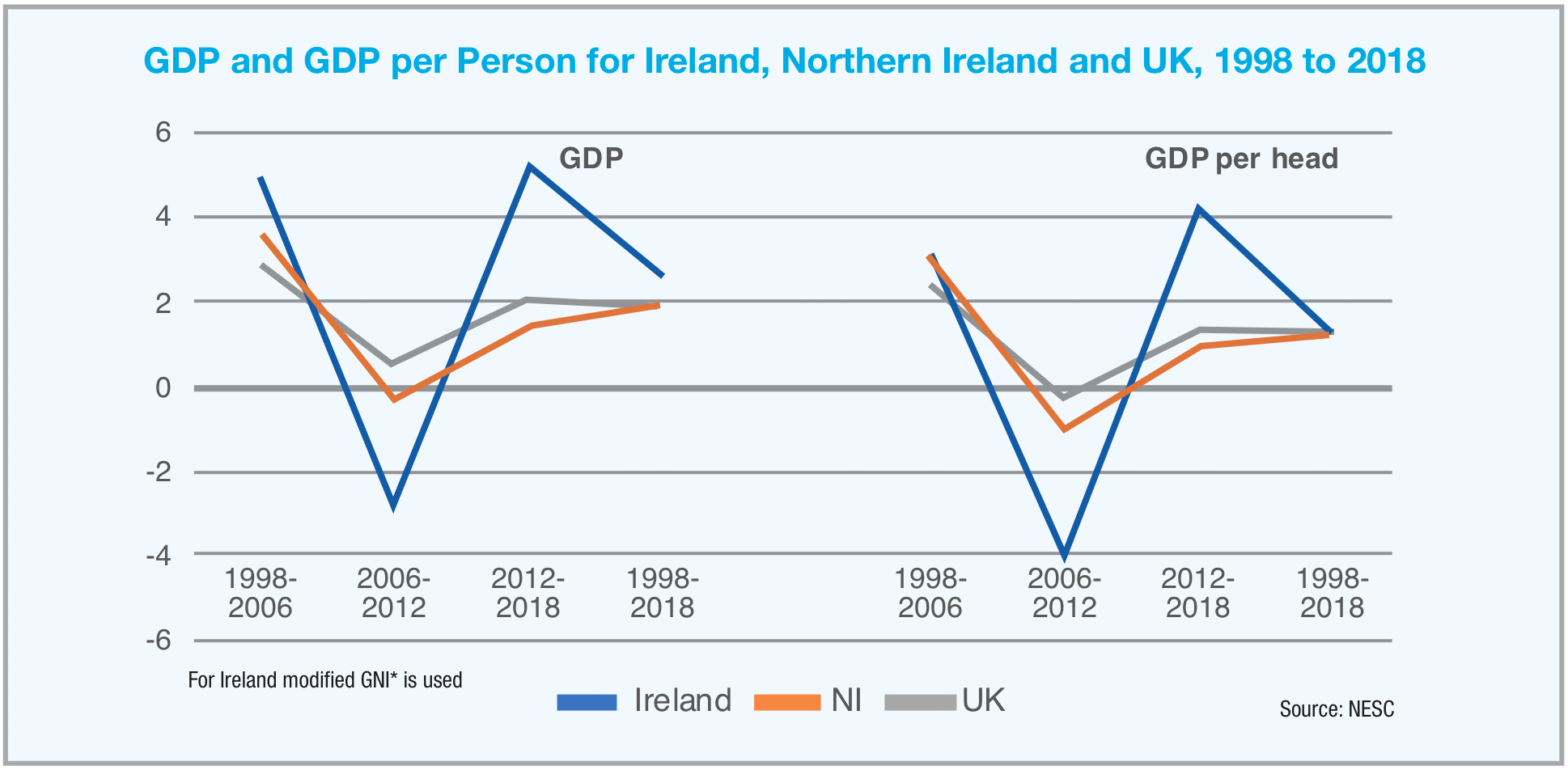The island economy

Research commissioned to inform a forthcoming shared island report by the Department of the Taoiseach has highlighted a range of opportunities in growing the island economy for both jurisdictions.
An existing island economy must be sustained through enhanced cross-border economic connections and co-operation for the benefit of both jurisdictions, the report by the National Economic and Social Council (NESC) concluded.
The Island Economy report details the evolution of the two economies on the island of Ireland, highlighting the similarities, differences and connections between them.
The research is part of NESC’s ongoing programme of research on the shared island initiative, being undertaken at the request of the Department of the Taoiseach, with the aim of producing a comprehensive report on the shared island in 2021.
The report finds that despite many differences in the two economies on the island of Ireland, there is clear evidence of an existing island economy and scope for expansion, which would bring benefits to both jurisdictions.
Strong economic growth in the Republic of Ireland underpins the variations in economic performance north and south of the island. In the early 1990s national income per head in Ireland was around 90 per cent of Northern Ireland’s GDP per head, but economic growth since then has led to it to now being substantially higher.
The Republic of Ireland’s economy has undergone two periods of rapid growth from the late 80s, highlighted by a rise in GNI per head from 62 per cent of the EU average in 1987 to 111 per cent in 2007. The financial crash of 2008 saw a sharp decline in GNI per head but by 2019 this had risen again to 109 per cent of the EU average.
By comparison, Northern Ireland’s economy has not experienced the same levels of growth, with GDP per head in 2018 around 82 per cent of the EU average. Despite both jurisdictions having similar shares of their population in employment, measures of income or output per head are considerably higher in the Republic of Ireland compared to Northern Ireland.

A greater stability in the Northern Ireland economy is highlighted by the impact of the financial crash on both economies. The Republic of Ireland’s annual average rate of unemployment (15 per cent) was double that of the highest rate in Northern Ireland (7.5 per cent). Pre-pandemic, Northern Ireland’s unemployment rate of 2.7 per cent in 2019 was favourable compared to a 5 per cent rate in the Republic.
However, NESC’s research points to a notable higher level of productivity in the Republic, explaining the higher aggregate income per head. “Higher productivity in Ireland arises primarily from higher productivity in individual sectors rather than differences in the structure of employment,” the research authors explain.
That higher productivity is reflected in higher wages in the Republic of Ireland. The research estimates that, with the higher cost of living in the Republic of Ireland factored in, annual gross earnings in the Republic are 20 per cent higher than in Northern Ireland.
A further difference in the two economies lies in relation to trade and specifically, their export bases. The research highlights that “Ireland has developed high-value sectors in goods and services that export on a very large scale to European and global markets”, a factor which has allowed the Republic’s economy to achieve strong growth in income and living standards. In comparison, Northern Ireland economy “is less export-oriented and has a higher share of goods rather than services in total exports” compared to the Republic. Northern Ireland’s external sales are substantially concentrated in Britain (€11.9 billion) and the Republic (€4.7 billion).
Links
Trade between the two economies is increasing as a result of Brexit. In 2018, Intertrade Ireland valued trade between the two economies at €7.4 billion. CSO figures for the first quarter of 2021 show a 44 per cent increase in exports from Northern Ireland to the Republic. The NESC reports evaluates that trade “represents the most substantial economic connection” on the island and adds that cross-border trade is of particular significance for smaller companies and as a steppingstone to larger markets.
Other economic links exampled include levels of cross-border travel to work and study, “successful and sustained cross-border cooperation” in the energy sector and agricultural output for the agri-food sector.
“The agri-food sector plays an important role on the island of Ireland. In both jurisdictions, dairy, and cattle account for the highest share of agricultural output. Agriculture north and south faces common environmental challenges and the same economic problem of volatile farm incomes. Given the similarities, common challenges and linkages in the agri-food sector, there would seem to be considerable scope for enhanced cooperation in the years ahead,” the report states.
As well as those evident existing links, the NESC research includes research by Intertrade Ireland which identifies three economically significant sectors of pharmaceuticals, medical devices and software as having considerable potential benefits from enhanced coordination in relation to research, innovation, education, and training.
“Other research on the Dublin-Belfast Economic Corridor identified many possibilities for beneficial cooperation, including the areas of skills development, research and infrastructure,” it adds.
Climate
However, probably the most notable opportunity for further development of the island economy is the common need to address the challenges of greenhouse gas reduction and biodiversity restoration, with the report’s authors assessing that “movement towards a sustainable pattern of economic development is required in both parts of the island”.
“Despite differences in the economies on the island, the expansion of cross-border trade and the increased interconnections of business on the island mean that to some extent an island economy has been developed. This needs to be sustained through enhanced co-operation, to the mutual benefit of both parts of the island.”
Interestingly, the report concludes that while Brexit poses unique challenges for the island, opportunities will be presented for some sectors.
“For Northern Ireland, there is also an overall opportunity in that it is the only region that, in relation to goods, enjoys no trade barriers to either the EU single market or the rest of the UK internal market. This should be used to reinvigorate investments in Northern Ireland,” it concludes.





